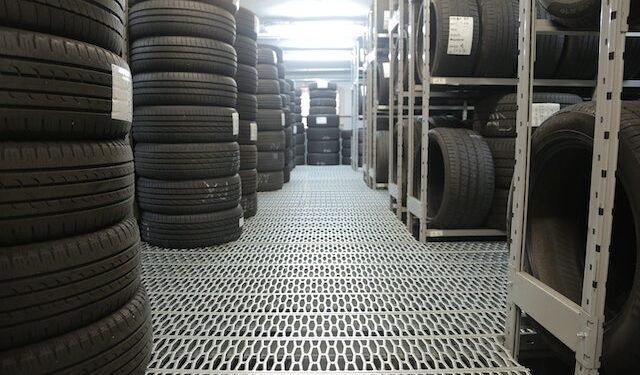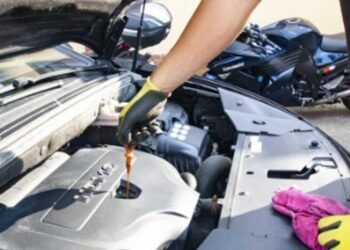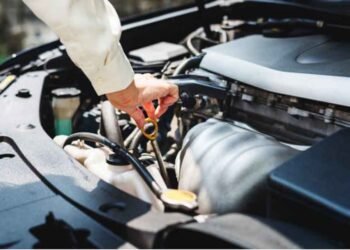If you’ve ever owned or operated a truck, you’ll know that tire maintenance isn’t just a recommendation—it’s a necessity. Just as we wouldn’t skip a doctor’s appointment for recurring pain, neglecting regular tire check-ups can lead to significant truck repair headaches down the line.
But it’s not just about avoiding repairs. Proper tire care is pivotal in heavy equipment’s overall lifespan and functionality.
The bottom line?
Proper tire maintenance can save time, money and stress in heavy equipment upkeep.
The Basics of Truck Tire Maintenance
- Understanding Tire Pressure
- Regular Tire Inspection
- Balancing Your Tires
- Rotating Your Tires
Understanding Tire Pressure:
When diving into the world of truck tire care, the first thing to grasp is tire pressure. Imagine a balloon—too much air, and it might pop; too little, and it won’t float as it should. Similarly, getting the correct tire pressure is crucial for safe driving and optimal performance.
Overinflated tires can be stiff and easily damaged, while underinflated ones can increase fuel costs and wear out faster. Keeping them in the Goldilocks zone means you’re looking after your tires and ensuring your heavy equipment maintenance is on point.
Regular Tire Inspection:
Regularly checking your tires, like a routine doctor’s visit, can prevent minor issues from escalating into big problems. Look for unwelcome guests like punctures, cracks, or bulges. But that’s not all—the depth and quality of your tire tread also play a starring role.
A good tread ensures a better grip on the road, leading to safer and more efficient drives. Ignoring this aspect might result in you sinking more time and money into heavy equipment maintenance later.
Balancing Your Tires:
Have you ever tried walking while holding a heavy bag in one hand? You probably felt off-balanced. The same goes for trucks. When the weight on tires isn’t evenly distributed, it can lead to premature wear and even an uncomfortable driving experience.
Knowing the signs of unbalanced tires, such as unusual vibrations, is critical. Addressing the balance ensures you take a holistic approach to maintaining heavy equipment.
Rotating Your Tires:
Tires, like people, sometimes need a change of scenery. Certain tires may wear out faster depending on their position on the truck. By regularly rotating them, you ensure each tire wears evenly over time.
Think of it as giving each tire a chance to serve in different roles, from leading at the front to supporting at the back. While the idea might seem simple, sticking to recommended rotation intervals is a small step with significant impacts, emphasising the overarching theme of proactive heavy equipment maintenance.
Advanced Care for Extended Lifespan
- Proper Cleaning
- Wheel Alignment
- Investing in Tire Covers
- Addressing Issues Promptly
Proper Cleaning
- Essential Focus:
Removing harmful substances like salt or chemicals that cling to truck tires can accelerate wear.
- Key Takeaway:
Opt for cleaning agents specifically designed for heavy-duty tires. A clean tire is visually appealing and can reduce unnecessary truck repair expenses.
Wheel Alignment
- Essential Focus:
Misaligned wheels can cause a truck to swerve or the steering wheel to vibrate, leading to uneven tire wear.
- Key Takeaway:
Stay ahead with regular alignment checks. Ensuring your wheels are correctly aligned can reduce wear and tear, preventing larger truck repair issues.
Investing in Tire Covers
- Essential Focus:
Tires exposed to prolonged sun and environmental factors can deteriorate faster, even when parked.
- Key Takeaway:
Tire covers act as protective shields, especially during extended storage periods. A simple cover can be the barrier that reduces future truck repair needs.
Addressing Issues Promptly
- Essential Focus:
Minor issues, if overlooked, can snowball into bigger problems.
- Key Takeaway:
Don’t delay in addressing concerns, no matter how small. Acting promptly can save significant truck repair costs in the long run.
The Relationship Between Tire Maintenance & Overall Heavy Equipment Maintenance
At first glance, tire maintenance is an isolated task, separate from the broader world of heavy equipment maintenance. However, this couldn’t be further from the truth. Tires are like heavy equipment shoes; the entire system struggles if worn out or unfit.
How Does Well-Maintained Tires Impact The Lifespan Of Heavy Equipment?
Well-maintained tires play a crucial role in the lifespan of heavy machinery. Just as a car runs smoother with proper tires, heavy equipment operates more efficiently and lasts longer when its tires are in top shape.
Think about it: issues with tires can cause strain on other parts of the equipment, leading to wear and tear in places you wouldn’t expect.
The Savings In Long-Term Costs Due To Proactive Maintenance
Moreover, investing time and resources in proactive tire care can lead to significant savings. This forward-thinking approach means fewer unexpected breakdowns and costly repairs, encapsulating the essence of effective heavy equipment maintenance.
The Role Of Tires In Ensuring Safe And Effective Equipment Operation
Lastly, beyond costs and longevity, there’s safety. Tires, the primary point of contact with the ground, are pivotal in ensuring safe and stable operations. Well-maintained tires provide better grip and stability, ensuring heavy equipment performs its tasks efficiently and safely.
In essence, tire maintenance isn’t just about the tires – it’s about safeguarding the entire heavy equipment system, reinforcing the importance of holistic heavy equipment maintenance.
Final Words
Taking care of your tires isn’t just about preventing a flat on the highway; it’s a smart investment that can significantly save truck repair costs. So, please don’t wait! Prioritise tire maintenance today and let it be a cornerstone of your overall heavy equipment maintenance routine.












